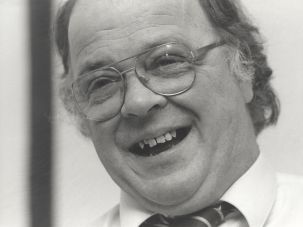A reflection by Gary Turkington
In a quiet moment, I draw together my thoughts of Michael Bungay QC, advocate, friend, wit, writer, lover, raconteur – he was all those things and more. In an instant "gone down to the tongueless silence of the dreamless dust."
So a reflection perhaps, before moving to those memories which shall remain, to the brief moment that each of us occupies in the galaxy of time … the strife of courtroom battle, the bubble of reputation, wealth to the quick … all momentarily in their right perspective.
To his parents, then, Londoners, Brixton, 1934: how would they have viewed now their wide eyed son in the year of his birth, with his early years, carefree and mischievous no doubt; a callow youth perhaps who escaped the shadow of war and from the most humble of beginnings rose to become one of the mightiest advocates in the land. A twinkle in the eye of the "old man" I see and serenity for his mother from the quiet pride of achievement.
Thoughts then of the army. It was such an opportunity that enabled him to come to New Zealand and try his luck in law part time in Wellington. He may have been an unwilling student who paraded at the early morning lectures of the day with a disdainful stare for tutors – at least one judicial officer has so remarked. Action beckoned at the Bar without delay.

Mike Bungay QC.
And so to practice in 1961, and after a brief flurry of experience, setting up on his own without connection or favour in a tumbledown building with others equally keen to make their mark. The daily round of legal aid, slumming it in the holding cells, looking for the brief that might launch a career. He once remarked that a lifetime might go by and a lawyer miss his mark, not through want of ability, but because chance did not provide a brief of such notoriety, that the springboard to fame was lost. Perhaps. But he was largely the master of his own destiny. His earthy style, commonsense, impish humour, one man against the overwhelming state – the stuff jurors understand and follow. And yes, there was always doubt, even in the worst case when a fanciful doubt might just be a reasonable doubt. No paper shuffler he, the art of the true advocate at the Bar is oratory and by reason, persuasion to a cause. So it was no coincidence that cases of great moment were successfully argued by him and those that made him truly famous occurred in quick succession: Sutch, Geiringer, Minnitt. From then the parade was endless with no less than 100 homicides to test his resolve, not to mention countless other cases from the criminal calendar.
To companionship. And was he often not at his best surrounded by cronies, regaling them with his jousts at the Bar? De Bretts on Friday night, even Thursday night, anytime … smoke wreathing, beer, whisky, glasses clinking, talk, laughter – and so on into the night, a distant cacophony – bleary eyed and sorry head next morning – punishment of the body but not the soul.
To sport. A distant pursuit for a busy barrister but surprisingly golf, a game not suited to the impatient found its tantalising qualities with him. Always a trier, he would often remark there was no such thing as a bad shot in golf for no matter, it was bound to have made someone happy.
Silk. Here was one of the proudest moments in his life when, in 1986, he was called to the Inner Bar. To many this was just recognition in a field which tended to the be province of the commercial men, and reward for advocacy in its finest form – great oratory before a jury.
Finally to his family. In recent years Rhonda was the boon companion. Chad, as years saw the great man mellow, the recipient of much affection. She was a profound influence on his direction and when ill health lengthened its shadow she was at his side, a staunch prop when away from home in distant hotels, anxious preparation for some major trial taxed his last resources. Then, in a lonely moment, on a motorway, gone – 58 years in which this man, this leader of the Bar was given his last exit on a stage in which there had been many parts, many entrances, which kept those who knew him well, enthralled. Farewell, Michael, farewell.
This reflection was first published in LawTalk 403, 26 October 1993, page 2.
Michael Anthony Bungay was born in London on 28 September 1934. A wartime evacuee, he left school at the age of 15 to serve briefly in the merchant navy before joining the Royal Marines from 1952 to 1954. He emigrated to New Zealand in 1956 and joined the New Zealand Army, studying part-time at university until he graduated in law in 1961 and began his legal career.
Mike Bungay became a barrister sole in 1983 and was appointed Queen's Counsel in 1986, becoming possibly New Zealand's best-known criminal defence lawyer. He appeared in well over 100 murder trials and was in demand as an after-dinner speaker, media commentator and host on talkback radio. In 1983 he co-authored Bungay on Murder with media commentator Brian Edwards.
He married Rosemary Moss in 1956, and the couple divorced in 1969. In 1987 he married Rhonda Wealleans. Rhonda, who worked closely with him over the later stages of his career, published Dear Murderer: Mike Bungay's Life on Trial, in 1997.
Mike Bungay QC died on 10 August 1993.
